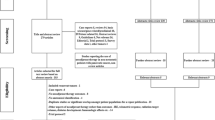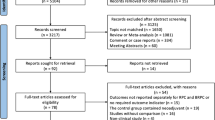Abstract
Background
In literature, percentages of pathologic complete response (pCR) in patients presenting with resectable (RES), borderline resectable (BLR) or locally advanced (LA) pancreatic cancer (PaC) after neoadjuvant treatment (NADT) are variable, ranging 0–33%. Those data come mostly from retrospective reviews of single centres. The objective of this systematic review is to assess the incidence of pCR.
Methods
Following the criteria of the PRISMA statement, a literature search was conducted looking for prospective papers focusing on neoadjuvant treatment in PaC. Retrospective papers, other than ductal carcinoma histologies and trials including metastatic patients, were excluded from the present review. Data extraction was carried out by 3 independent investigators. Meta-analysis was performed with ProMeta3 Software (Internovi, 2015). PROSPERO registry: CRD42018095641.
Results
The literature search of Embase, Cochrane and Medline with the terms “neoadjuvant OR preoperative”, “pancreatic OR pancreas” and “cancer OR adenocarcinoma OR tumor” led to the identification of 3128 papers. We restricted the search to humans, last 10 years and English language articles resulting in 1158 eligible articles to review. Extended paper revision led to the inclusion of 27 papers. Complete pathologic response ranged 0–11.11%, at the meta-analysis 4% (95% CI 3–5%), in prospective studies 0–9.09% and in prospective databases 1.63–11.11%.
Conclusions
Pathologic complete response in pancreatic cancer is actually infrequent: high-quality studies provide a more reliable picture of neoadjuvant effects, high rates of pCR are reported in selected retrospective studies but it is overestimated.






Similar content being viewed by others
Change history
09 November 2021
A Correction to this paper has been published: https://doi.org/10.1007/s11605-021-05190-z
References
Siegel RL, Miller KD, Jemal A. Cancer statistics, 2018. CA Cancer J Clin. (2018). https://doi.org/10.3322/caac.21442
D'Angelo F, Antolino L, Farcomeni A et al. Neoadjuvant treatment in pancreatic cancer: Evidence-based medicine? A systematic review and meta-analysis. Med Oncol. (2017). https://doi.org/10.1007/s12032-017-0951-0.
Casadei R, Di Marco M, Ricci C et al. Neoadjuvant Chemoradiotherapy and Surgery Versus Surgery Alone in Resectable Pancreatic Cancer: A Single-Center Prospective, Randomized, Controlled Trial Which Failed to Achieve Accrual Targets. J Gastrointest Surg. (2015). https://doi.org/10.1007/s11605-015-2890-4.
Verbeke C, Häberle L, Lenggenhager D, Esposito I. Pathology assessment of pancreatic cancer following neoadjuvant treatment: Time to move on. Pancreatology. (2018). https://doi.org/10.1016/j.pan.2018.04.010
Evans DB, Rich TA, Byrd DR et al. Preoperative chemoradiation and pancreaticoduodenectomy for adenocarcinoma of the pancreas. Arch Surg. (1992). https://doi.org/10.1001/archsurg.1992.01420110083017
Liberati A, Altman DG, Tetzlaff J, et al. The PRISMA Statement for reporting systematic reviews and meta-analyses of studies that evaluated health care interventions: explanation and elaboration. PLoS Med. (2009).
Higgins, JPT, Green S (editors). Cochrane Handbook for Systematic Reviews of Interventions Version 5.1.0 [updated March 2011]. The Cochrane Collaboration, 2011. Available from www.handbook.cochrane.org. Accessed 23 July 2019
Turrini O, Ychou M, Moureau-Zabotto L et al. Neoadjuvant docetaxel-based chemoradiation for resectable adenocarcinoma of the pancreas: New neoadjuvant regimen was safe and provided an interesting pathologic response. Eur J Surg Oncol. (2010). https://doi.org/10.1016/j.ejso.2010.07.003.
Cardenes HR, Moore AM, Johnson CS et al. A phase II study of gemcitabine in combination with radiation therapy in patients with localized, unresectable, pancreatic cancer: a Hoosier Oncology Group study. Am J Clin Oncol. (2011). https://doi.org/10.1097/COC.0b013e3181e9c103.
Sahora K, Kuehrer I, Schindl M et al. NeoGemTax: gemcitabine and docetaxel as neoadjuvant treatment for locally advanced nonmetastasized pancreatic cancer. World J Surg. (2011). https://doi.org/10.1007/s00268-011-1113-8.
Sahora K, Kuehrer I, Eisenhut A et al. NeoGemOx: Gemcitabine and oxaliplatin as neoadjuvant treatment for locally advanced, nonmetastasized pancreatic cancer. Surgery (2011). https://doi.org/10.1016/j.surg.2010.07.048.
Satoi S, Toyokawa H, Yanagimoto H et al. Neo-adjuvant chemoradiation therapy using S-1 followed by surgical resection in patients with pancreatic cancer. J Gastrointest Surg. (2012). :10.1007/s11605-011-1795-0.
Shinoto M, Yamada S, Yasuda S et al. Working Group for Pancreas Cancer. Phase 1 trial of preoperative, short-course carbon-ion radiotherapy for patients with resectable pancreatic cancer. Cancer. (2013). https://doi.org/10.1002/cncr.27723.
Lee JL, Kim SC, Kim JH et al. Prospective efficacy and safety study of neoadjuvant gemcitabine with capecitabine combination chemotherapy for borderline-resectable or unresectable locally advanced pancreatic adenocarcinoma. Surgery. (2012) https://doi.org/10.1016/j.surg.2012.03.010.
Van Buren G , Ramanathan RK, Krasinskas AM et al. Phase II study of induction fixed-dose rate gemcitabine and bevacizumab followed by 30 Gy radiotherapy as preoperative treatment for potentially resectable pancreatic adenocarcinoma. Ann Surg Oncol. (2013). https://doi.org/10.1245/s10434-013-3161-9.
Kim EJ, Ben-Josef E, Herman JM et al. A multi-institutional phase 2 study of neoadjuvant gemcitabine and oxaliplatin with radiation therapy in patients with pancreatic cancer. Cancer. (2013). https://doi.org/10.1002/cncr.28117.
Jensen EH, Armstrong L, Lee C et al. Neoadjuvant interferon-based chemoradiation for borderline resectable and locally advanced pancreas cancer: a Phase II pilot study. HPB (Oxford). (2014). https://doi.org/10.1111/hpb.12086
Sherman WH, Chu K, Chabot J et al. Neoadjuvant gemcitabine, docetaxel, and capecitabine followed by gemcitabine and capecitabine/radiation therapy and surgery in locally advanced, unresectable pancreatic adenocarcinoma. Cancer (2015) 121 (5):673-680. https://doi.org/10.1002/cncr.29112.
Takeda Y, Nakamori S, Eguchi H et al. Neoadjuvant gemcitabine-based accelerated hyperfractionation chemoradiotherapy for patients with borderline resectable pancreatic adenocarcinoma. Jpn J Clin Oncol. (2014). https://doi.org/10.1093/jjco/hyu143.
Herman JM, Chang DT, Goodman KA et al. Phase 2 multi-institutional trial evaluating gemcitabine and stereotactic body radiotherapy for patients with locally advanced unresectable pancreatic adenocarcinoma. Cancer. (2015). doi: https://doi.org/10.1002/cncr.29161.
Kapoor R, Khosla D, Gupta R, Bahl A, Shukla AK, Sharma SC. Role of neoadjuvant concurrent chemoradiation in locally advanced unresectable pancreatic cancer: a feasibility study at tertiary care centre. Indian J Cancer. (2014). https://doi.org/10.4103/0019-509X.138295.
OʼReilly, EM, Perelshteyn A, Jarnagin WR, et al. A single-arm, nonrandomized phase II trial of neoadjuvant gemcitabine and oxaliplatin in patients with resectable pancreas adenocarcinoma.Ann Surg. (2014). https://doi.org/10.1097/SLA.0000000000000251.
Miura JT, Krepline AN, George B et al. Use of neoadjuvant therapy in patients 75 years of age and older with pancreatic cancer. Surgery. (2015). https://doi.org/10.1016/j.surg.2015.06.017.
Golcher H, Brunner TB, Witzigmann H et al. Neoadjuvant chemoradiation therapy with gemcitabine/cisplatin and surgery versus immediate surgery in resectable pancreatic cancer: results of the first prospective randomized phase II trial. Strahlenther Onkol. (2015). https://doi.org/10.1007/s00066-014-0737-7.
Katz MH, Shi Q, Ahmad SA, Herman JM et al. Preoperative Modified FOLFIRINOX Treatment Followed by Capecitabine-Based Chemoradiation for Borderline Resectable Pancreatic Cancer: Alliance for Clinical Trials in Oncology Trial A021101. JAMA Surg. (2016). https://doi.org/10.1001/jamasurg.2016.1137.
Chan E, Arlinghaus LR, Cardin DB et al. Phase I trial of vorinostat added to chemoradiation with capecitabine in pancreatic cancer. Radiother Oncol. (2016). https://doi.org/10.1016/j.radonc.2016.04.013.
Ielpo B, Caruso R, Duran H et al. A comparative study of neoadjuvant treatment with gemcitabine plus nab-paclitaxel versus surgery first for pancreatic adenocarcinoma. Surg Oncol. (2017). https://doi.org/10.1016/j.suronc.2017.08.003.
Okano K, Suto H, Oshima M et al. A Prospective Phase II Trial of Neoadjuvant S-1 with Concurrent Hypofractionated Radiotherapy in Patients with Resectable and Borderline Resectable Pancreatic Ductal Adenocarcinoma. Ann Surg Oncol. (2017). https://doi.org/10.1245/s10434-017-5921-4.
Nagakawa Y, Hosokawa Y, Nakayama H et al. A phase II trial of neoadjuvant chemoradiotherapy with intensity-modulated radiotherapy combined with gemcitabine and S-1 for borderline-resectable pancreatic cancer with arterial involvement. Cancer Chemother Pharmacol. (2017). https://doi.org/10.1007/s00280-017-3288-7.
Kondo N, Murakami Y, Uemura K et al. A phase 1 study of gemcitabine/nab-paclitaxel/S-1 (GAS) combination neoadjuvant chemotherapy for patients with locally advanced pancreatic adenocarcinoma. Cancer Chemother Pharmacol. (2017). https://doi.org/10.1007/s00280-017-3274-0.
Robert W de Marsh, Talamonti MS, Baker MS et al. Primary systemic therapy in resectable pancreatic ductal adenocarcinoma using mFOLFIRINOX: A pilot study. J Surg Oncol. (2018). https://doi.org/10.1002/jso.24872.
Saito K, Isayama H, Sakamoto Y et al. A phase II trial of gemcitabine, S-1 and LV combination (GSL) neoadjuvant chemotherapy for patients with borderline resectable and locally advanced pancreatic cancer. Med Oncol. (2018). https://doi.org/10.1007/s12032-018-1158-8.
Hayashi T, Nakamura T, Kimura Y, Yoshida M, Someya M, Kawakami H, Sakuhara Y, Katoh N, Takahashi K, Ambo Y, Miura K, Motoya M, Tanaka E, Murakawa K, Yamabuki T, Yamazaki H, Katanuma A, Hirano S; Hokkaido Pancreatic Study Group. Phase 2 Study of Neoadjuvant Treatment of Sequential S-1-Based Concurrent Chemoradiation Therapy Followed by Systemic Chemotherapy with Gemcitabine for Borderline Resectable Pancreatic Adenocarcinoma (HOPS-BR 01). Int J Radiat Oncol Biol Phys. 2019 Nov 1;105(3):606-617.
Lee SH, Kang CM, Kim H, Hwang HK, Song SY, Seong J, Kim MJ, Lee WJ Pathological Complete Remission of Pancreatic Cancer Following Neoadjuvant Chemoradiation Therapy; Not the End of Battles Medicine (Baltimore). 2015 Dec;94(52):e2168. doi: https://doi.org/10.1097/MD.0000000000002168.
Feakins R, Campbell F, Verbeke CS. Survey of UK histopathologists’ approach to the reporting of resection specimens for carcinomas of the pancreatic head. J Clin Pathol. (2013). https://doi.org/10.1136/jclinpath-2012-201198.
Verbeke C, Löhr M, Karlsson JS, Del Chiaro M. Pathology reporting of pancreatic cancer following neoadjuvant therapy: challenges and uncertainties. Cancer Treat Rev. (2015). https://doi.org/10.1016/j.ctrv.2014.11.002.
Cloyd JM, Chen HC, Wang X et al. Chemotherapy Versus Chemoradiation as Preoperative Therapy for Resectable Pancreatic Ductal Adenocarcinoma: A Propensity Score Adjusted Analysis. Pancreas. (2019). doi: https://doi.org/10.1097/MPA.0000000000001231.
Vidri RJ, Vogt AO, Macgillivray DC, Bristol IJ, Fitzgerald TL. Better Defining the Role of Total Neoadjuvant Radiation: Changing Paradigms in Locally Advanced Pancreatic Cancer. Ann Surg Oncol (2019) 26:3701-3708
He J, Blair AB, Groot VP et al. Is a Pathological Complete Response Following Neoadjuvant Chemoradiation Associated With Prolonged Survival in Patients With Pancreatic Cancer? Ann Surg. (2018). https://doi.org/10.1097/SLA.0000000000002672.
Conroy T, Desseigne F, Ychou M et al. Groupe Tumeurs Digestives of Unicancer; PRODIGE Intergroup. FOLFIRINOX versus gemcitabine for metastatic pancreatic cancer. N Engl J Med. (2011). https://doi.org/10.1056/NEJMoa1011923.
Sadot E, Doussot A, O'Reilly EM et al. FOLFIRINOX Induction Therapy for Stage 3 Pancreatic Adenocarcinoma. Ann Surg Oncol. (2015). https://doi.org/10.1245/s10434-015-4647-4.
Zhao Q, Rashid A, Gong Y et al. Pathologic complete response to neoadjuvant therapy in patients with pancreatic ductal adenocarcinoma is associated with a better prognosis. Ann Diagn Pathol. (2012) https://doi.org/10.1016/j.anndiagpath.2011.08.005.
Mellon EA, Jin WH, Frakes JM et al. Predictors and survival for pathologic tumor response grade in borderline resectable and locally advanced pancreatic cancer treated with induction chemotherapy and neoadjuvant stereotactic body radiotherapy. Acta Oncol. (2017). https://doi.org/10.1080/0284186X.2016.1256497.
Dinaux, A, Amri, R, Bordeianou, L et al. The Impact of Pathologic Complete Response in Patients with Neoadjuvantly Treated Locally Advanced Rectal Cancer—a Large Single-Center Experience J Gastrointest Surg (2017). https://doi.org/10.1007/s11605-017-3408-z et al
Li J, Li L, Yang L et al. Wait-and-see treatment strategies for rectal cancer patients with clinical complete response after neoadjuvant chemoradiotherapy: a systematic review and meta-analysis. Oncotarget. (2016). https://doi.org/10.18632/oncotarget.8622.
Yachida S, Jones S, Bozic I, et al. Distant metastasis occurs late during the genetic evolution of pancreatic cancer. Nature. 2010;467(7319):1114-1117.
Cloyd JM, Ejaz A, Shen C, Dillhoff M, Williams TM, Noonan A, Pawalik TM, Tsung A Pathologic Complete Response Following Neoadjuvant Therapy for Pancreatic Ductal Adenocarcinoma: Defining the Incidence, Predictors, and Outcomes HPB (Oxford) 2020 Feb 13[Online ahead of print]. https://doi.org/10.1016/j.hpb.2020.01.013
Author information
Authors and Affiliations
Contributions
LA: design of the study; MC, GM and MSM: literature review; LA, MC and AC: data extraction and bias assessment; LA, PA and AC: drafting and data analysis; AK, NP, GN and SV: critical revision and editing; FDA and GR: revision and approval of the final version.
Corresponding author
Ethics declarations
Conflict of Interest
The authors declare that they have no conflicts of interest
Additional information
Publisher’s Note
Springer Nature remains neutral with regard to jurisdictional claims in published maps and institutional affiliations.
Electronic Supplementary Material
ESM 1
(DOCX 17 kb)
Rights and permissions
About this article
Cite this article
Laura, A., Anna, C., Cinquepalmi, M. et al. Is Complete Pathologic Response in Pancreatic Cancer Overestimated? A Systematic Review of Prospective Studies. J Gastrointest Surg 24, 2336–2348 (2020). https://doi.org/10.1007/s11605-020-04697-1
Received:
Accepted:
Published:
Issue Date:
DOI: https://doi.org/10.1007/s11605-020-04697-1




